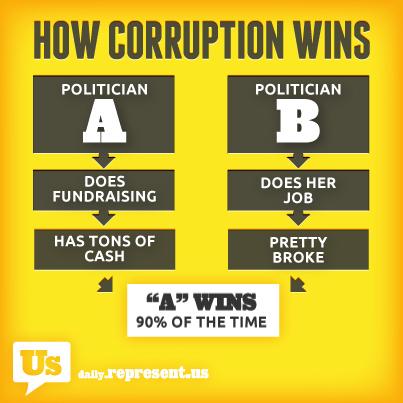The outgoing President of the (right-wing) Australian Liberal Party, Alan Stockdale, has called for corporations to be given the option to ‘join’ the Liberals as affiliates, similar to the link trade unions and Labour parties around the world. It should be noted that the role of President is not as influential as that of the Leader in the Liberal Party, and as such his speech floated many ideas which are unlikely to be acted on. However, Mr Stockdale has prompted a broad, international debate about the relationship between political parties and corporations.
Most democracies suffer from the financial and political entanglement of political parties and vested interests. However, as EU law requires shareholder approval for any corporate donations, the problem is, in theory, reduced to that of rich individuals buying political influence. That is a huge problem, but it pales in comparison to Australia and the US, where political parties depend on corporations for the bulk of their funding. In the US’ case, it’s the only way they can raise the billions of dollars needed to fund a space race in political advertising that grows more expensive, but less effective, with every campaign.
It is not difficult to trace the origin of various governments’ policies to their financial backing by various industries. For example, Hollywood’s well-documented support for the Democratic Party might help explain the latter’s backing for draconian ‘intellectual property’ legislation. Similarly, the open wallets of companies such as Exxon Mobil and Domino’s Pizza coincided with the last Republican administration’s lax regulation of the oil and fast food industries. Thus, it seems that corporations exert more than enough influence on political parties as it is. Imagine the havoc that would follow corporate membership of political parties, with the associated rights to vote in selections and conferences. Surely our democracies should outlaw commercialised politics (or is that politicised commercialism?), not formalise it.
An alternative viewpoint has been put to me. For several decades in Britain, voters did not have a choice between Labour and Conservative governments. Rather, they chose between Conservative-CBI (Confederation of British Industry) coalitions and Labour-TUC (Trade Union Congress) coalitions. Whilst this is an exaggeration, it is true that there were clear, transparent bonds between business and the Conservative Party. Some argue that this is preferable to the shady, secretive influence that business will exert regardless of the law.

Furthermore, Labour parties are open about their formal associations with trade unions and their members. Why apply the same principle to business?
In fact, there are several good reasons. Corporations would probably exercise block votes, and their money often is able to breach any formal restrictions on their powers within organisations, as businesses’ donations to charity have shown. Moreover, individual members, realising their inevitable powerlessness compared to the bloc votes and resources of, say, Wal-Mart, would abandon political parties en masse, undermining the principle of participatory democracy. There could even be pressure within parties to give businesses votes in general elections.
But there is one reason above all others why political parties should strongly oppose any formal business affliation: it would be electoral suicide. Voters are (fairly) tolerant of trade union involvement in politics because unions do not exist to exploit others, and are fundamentally democratic institutions. The same cannot be said of commercial interests. Every policy a business-affiliate party announced would be scrutinised to see how it benefits one commercial interest or another. Ultimately, voters cannot trust parties which are not run for the benefit of people.
But if the Liberal Party is inclined to agree with their President’s suggestions, many would welcome their inevitable descent into irrelevance.

